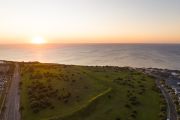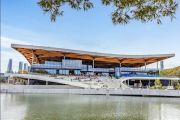
From playboy pub baron to bankruptcy: Inside Jon Adgemis’ $1.8b fall
The end, when it came for Jon Adgemis this week, could be traced right back to the beginning.
Adgemis’ plans to turn himself from a KPMG dealmaker with Rich List mates into a Justin Hemmes-style pub baron started 10 years ago with two down-on-their-luck pubs bearing the same name.
The Exchange hotels in Darlinghurst and Balmain must have looked like opportunities. Both were grand but needing an upgrade. Both were in historically busy pub areas that – as young people were priced out of their suburbs – weren’t as popular as they had been.
Both were bought with the support of people Adgemis knew well, and had spent years cultivating as friends. As the grandson of a Greek fish shop owner backed himself to go out on his own, they were backing him too.
The $5 million he spent in Balmain included money borrowed from Jan Cameron, the wealthy founder of retail chain Kathmandu and a client from his day job as a rainmaker at KPMG.
And the plan was simple enough: buy off-Broadway, unloved pubs at affordable prices, glow them up, add a fancy restaurant and convert the Victorian-era accommodation upstairs into boutique hotel rooms, and quickly turn a profit.
But 10 years later and the two Exchanges haven’t served a beer – or delivered a dollar in revenue – in years. In Balmain, some windows are boarded up and there’s a hole in the ceiling.
The new downstairs bar that Adgemis’ Public Hospitality Group installed is covered in dust. A construction site poster listing emergency contacts is hopelessly out-of-date.
“Have they put my name on it again?” asks the builder listed when contacted last month.
On Thursday, after buying 22 pubs and hotels and a few nearby properties and incurring an incredible $1.8 billion in debts, Adgemis’ dream was officially buried under a personal bankruptcy.
The man whose frequent gossip column appearances driving fast cars with attractive women cultivated a playboy image had instead become his generation’s Alan Bond (though not a criminal), crushed under the same debt, in nominal terms, that Bond had amassed when his empire collapsed 33 years ago. (At 47, he’s nearly 10 years younger than Bond was.)
Adgemis’ messy downfall – he avoided a court showdown on Friday by bankrupting himself – left in his wake a trail of current and former creditors including hospitality workers, rich former friends, big investment banks, New York financiers, the tax man and a trail of discarded Sydney pubs.
AFR Weekend spoke to more than 25 people who have dealt with him, worked for him, lent to him, and fallen out with him. They talk of his charm and ability to convince people to hand over money.
Others speak of constantly shifting priorities and projects. Many say it’s difficult to trust anything he says. “Jon had a real hard time keeping a train of thought,” one former executive says.
His downfall is a familiar tale of a businessman long on hubris and short on competence.
But it’s also a mystery, and a cautionary tale for the booming private credit market. How could a man keep borrowing while rarely, if ever, delivering on his promises to turn pubs into money machines? And, the biggest mystery of all, how could so many apparently intelligent people lend Adgemis so much that he’d end up owing $1.8 billion on properties that cost only about $280 million in the first place?
The question is probably best put by an investor who, after seeing their money put into Public Hospitality via a private credit fund, stands to lose the lot.
“We’ve lent someone money who is already in financial strife,” they told AFR Weekend. “I don’t understand why you would invest so much with this one person.”
Jon Angelo George Adgemis grew up in Sydney’s wealthy eastern suburbs. The son of migrants from Kastellorizo, the Greek island home of businessman Andrew Liveris and the Paspaley family, his grandmother was the oldest Greek Australian when she died in 2021 at 109.
He went to one of Sydney’s most elite private boys schools, Cranbrook, and studied economics at the University of Sydney before joining KPMG. After a stint at Gresham Partners working on the merger of BHP and Billiton, he returned to KPMG in 2005 as the firm ramped up its work on mergers and acquisitions.
In 2007, Adgemis became KPMG’s youngest partner at 28. “Jon was a very good banker, clients loved him – he was smooth, quite intelligent and very connected,” one banker says.
He developed a client list that liked to mix business and friendship, notably with eccentric Rich Listers including retailer Cameron and WIN television owner Bruce Gordon.
Adgemis grew so close to Bermuda-based Gordon that in 2016 – on the day it was revealed he’d bought the Exchange in Balmain – he attended the Nine annual general meeting with Gordon’s son Andrew on behalf of Bruce, who then owned 14.9 per cent of Nine, owner of The Australian Financial Review.
The paper’s Rear Window column captured his ascent at that time. “We spotted Adgemis cruising along Phillip Street in a soft-top black Maserati, the convertible retracted to let the hot spring breeze tousle the most coveted locks in Australian M&A.”
But business success brought personal trouble. He split with his wife in the mid-2000s and quickly became a favourite of the gossip columns. “I have met the love of my life,” Adgemis’ one-time partner, TV financial journalist Karen Tso, told The Sun-Herald in November 2008. “He’s this incredible, perfect guy. Tall, dark and handsome and just so focused … No matter how dramatic the day is on the stock market it all pales when I go home to him.”
By 2015, Adgemis was entering his late 30s and formulating a plan to make his own fortune, one that looked like a mini-Merivale, the pub empire that has generated a $1.6 billion fortune for Hemmes.
But while Hemmes has built his family’s company into a behemoth, he got a head start thanks to key investments in prime Sydney property by his father John and mother Merivale; they appeared on the second-ever Rich List in 1984 with family wealth of $12 million.
Adgemis didn’t have that head start. What he did have was friends and acquaintances with plenty of money.
“He’s a man who advised millionaires and billionaires for years,” a former business associate said. “And he was in a hurry to become one of them.”
When Adgemis wanted to buy his first pub he went to see his friend Cameron, known for being a philanthropist eco-warrior with a “take-no-prisoners approach to business”.
Cameron stumped up money to help buy both Exchange hotels, but was clear the money was a loan, not an investment. Her companies would lodge multiple caveats as unregistered lenders to the two Exchange Hotels.
At the time, Adgemis’ co-investors included pub and nightclub developer Greg Magree, a close friend of Kings Cross personality John Ibrahim, and property financier Kelvin Smith. (Ibrahim was often spotted touring venues with Adgemis.)
Over the next few years, Adgemis bought more pubs. The Kurrajong Hotel in Erskineville and the Town Hall Hotel in Balmain were added in 2017. The Camelia Grove Hotel in Alexandria followed in 2020. There was also an ambitious residential development in Crows Nest.

The purchases and renovations needed money, and Cameron seemed happy to keep lending. By 2021, through principal and interest, Adgemis owed the reclusive retailer $68 million.
The good times couldn’t last. In 2020, the relationship that began in 2009 exploded spectacularly when he became the Australian Securities and Investments Commission’s star witness in its prosecution of Cameron over her alleged failure to disclose a 15 per cent shareholding in listed dairy company Bellamy’s. The holding, the court found, had been hidden in a Caribbean tax haven – and had been incorporated by Adgemis when he was at KPMG. (Cameron was found guilty and fined $8000.)
“Dealing with him was not ever transparent, it was very obscure, and not reliable,” Cameron said in April 2022. “I’m relieved to have Jon out of my life.” By then, Adgemis had paid her back in full.
Adgemis also fell out with Bruce Gordon over money. The TV proprietor sued him in 2021 to repay a $10 million loan, related to the property development in Sydney’s Crows Nest. At the time, Adgemis called the dispute with Gordon a “misunderstanding”.
Maybe so. But the Gordon suit and an attempt in late 2020 by another company involved in the Crows Nest development to bankrupt Adgemis – which involved sheriffs being sent to his home – were the first big red flags about Public’s liquidity.
At bank and non-bank lenders, however, the red flags were ignored.
From here on, borrowing money was going to be more expensive. Adgemis ploughed on.
In late 2021, just as COVID’s omicron wave was hitting, Adgemis announced he’d hired veteran Crown Resorts heavyweight Peter Crinis to lead the company into an ASX listing the following year.
“They plan to float a $400 million hotel company stocked up with cool inner-city and regional properties that appeal to a younger crowd,” The Australian reported. The pair touted their plans as being akin to funky international brands Ace, Soho and Generator.
The expansion coincided with the growth of private credit. As banks pulled back from lending to developers and restaurants, after the banking royal commission, private lenders were happy to fill the vacuum. And as interest rates started to rise, there was money to be made, especially from borrowers with difficult credit histories.
At the same time, Australia’s $3 trillion super industry was maturing, billions poured into self-managed funds and financial advisers noticed the double-digit returns offered by private credit.
The returns were higher because borrowers were riskier. Rates were crushing, sometimes around 20 per cent. Many loans were short term, and interest would be even more onerous if “default rates” applied.
As inflation pushed up the cost of renovating old pubs, Adgemis was borrowing money for properties on valuations that far outweighed the purchase price. They were valued – often by a company called Egan National Valuers – as if the refurbishments were completed, at figures generously described as rosy.
One of the lenders Adgemis turned to was Gemi, which specialises in short-term commercial property-backed debt at high interest rates.
Gemi told its investors that Adgemis was a successful businessman and a safe bet. The investors – many wealthy Sydney families – were shocked to find they were helping to finance Adgemis, and are now in talks with class action lawyers.
The numbers involved were dizzying. The Clifton Hotel on High Street in Melbourne’s Kew illustrates how it worked. Bought in 2021 for $6.8 million, The Clifton was then revalued the same year at $21 million in order for Adgemis to secure a $12 million loan against it from Gemi.
First, Gemi took a 2.2 per cent “line fee” from Adgemis, calculated as a percentage of the loan amount. On top of that, the interest rate was 16.5 per cent, with an extra 5 per cent applied if it went into default – which many of Adgemis’ loans did.
Investors were told Adgemis had a personal fortune of $40 million, which the short three-month loan was secured against. Gemi registered a caveat against the property in 2022. But it was already mortgaged to another private credit firm, Yorkway Private. Now, the pub is for sale for $7 million to $8 million.
Adgemis would negotiate loans in a similar way against most of his properties. In many cases, loans were secured against lofty and unrealistic valuations far beyond the purchase price.
In February 2022, he attempted to raise more debt via $40 million of convertible notes with Alex Waislitz’s Thorney Investments as the cornerstone note holder and shareholder. Only $15 million was raised.
Sydney margin-loan veteran Lance Rosenberg’s Gleneagles was another investor. “Jon’s got an incredible flair for pulling in quality management, empowering them and putting it all together, and it’s not proven yet, but we really like what we’ve seen so far with what’s open,” Rosenberg said in February 2022.
By April 2023, the wheels were starting to fall off. Crinis had quietly left and Adgemis’ financial difficulties were becoming known. Media coverage had turned from describing him as a “glamour banker” with the “Midas touch” to junk-debt-laden pub player.
“People just look at us as an overleveraged pub player [and ask] ‘how does he get out?’” Adgemis told Rear Window at the time. “First and foremost, we’re a property private equity group. We might do hospitality … but our main focus is extracting full value from the property.”
But at several of his venues, there was no value at all being extracted because they were closed.
Adgemis took on more loans to pay debts and fuel expansion. He fell out with a long list of executives and business collaborators, including chefs Alessandro Pavoni, Guy Grossi and George Calombaris who have cut ties with the former dealmaker.
His venues and his own personal property took on mortgages and associated caveats; the vast majority had second mortgages, and some even had third.
“Despite past mistakes, people just continue to give him money,” says one of Adgemis’ former employees. “That’s his skill.”
“He’s the best talker I’ve heard in my life – gift of the gab, he makes you feel like you are listened to,” one former business associate of Adgemis says. “He could talk anyone into working for him – unless you’ve already worked for him.”
It was all part of a money-go-round that was starting to spin wildly out of control. A former executive at a private credit firm which lent to Adgemis said they knew he would struggle to repay but believed they would be able to collect the interest then refinance to another lender.
He even allegedly mortgaged an investment property he co-owned with his mother without telling her. His sister and nephew were living there until La Trobe Financial took possession of the house in July this year.
His mother is now in dispute with La Trobe over her share of the house. He borrowed funds from all sorts of friends and associates, including an ex-partner’s father, according to former Public employees. Another major backer was Ben Madsen’s Archibald Capital, which specialises in distressed lending.

While many investors, such as those in the Gemi funds, were wealthy, others were not. It’s unclear which La Trobe funds were exposed to the Adgemis loans, but the firm raises money from retail investors.
By early 2024, Public’s debts were crushing, and the group needed to refinance $500 million of its debt. Private equity firm Bain Capital, which bought Virgin after it collapsed, ran the rule over the business but walked after a few months.
By now the red flags were fully unfurled and flapping wildly. Everyone knew Adgemis was in deep, deep trouble.
But the dealmaker persisted and managed to persuade one of the world’s biggest financial institutions, Deutsche Bank, to lead a $400 million refinancing, which also included Gemi, Archibald and New York-based lender Muzinich & Co, in July 2024. The deal split Public’s assets into three pools, with Deutsche taking over as senior lender to some of Adgemis’ best assets, including the former Noah’s backpackers at Bondi.
Later, when one of his companies was examined by administrators BDO, they questioned the legality of the July refinance. “Further investigations are warranted in respect to … whether they constitute as creditor defeating dispositions,” BDO’s Duncan Clubb said.
Any stability brought about by the refinancing didn’t last long. By September, Muzinich appointed administrators to the five venues it held security over in Sydney. It was the beginning of the end.
The final straw would be a falling-out with Richard Gazal. The son of the late rag trader Joe Gazal had chased him since 2023 for $26 million – a debt well beyond what he initially borrowed for property investment.
When Gazal started bankruptcy proceedings this year, Adgemis signed over his assets to a trustee, insolvency firm WLP Restructuring, in a desperate bid to convince his creditors to take just $2.3 million or 0.15¢ in the dollar for the $1.8 billion he owed – the majority of which relate to personal guarantees Adgemis has given on money owed by Public.
That offer included contributions from his mother and sister.
Many creditors were furious Adgemis had been paying more than $60,000 a month to rent a luxury apartment in Bondi owned by billionaire Will Vicars, while driving around Sydney’s eastern suburbs in a Mercedes-Benz G wagon.
Tax authorities have been investigating Adgemis and his companies for well over a year and raided his home and office in May 2024. Documents seen by the Financial Review show potential tax debts of just under $300 million across 27 companies.
Insolvency firm BRI Ferrier is attempting to take control of a number of liquidations and its lawyers alleged potential GST fraud during Adgemis’ twice-adjourned creditors’ meeting. Adgemis denies any wrongdoing, and legal action has not been taken in relation to the allegations.
A public reckoning for Adgemis and his associates is still on the cards. His bankruptcy means he can no longer run a company, but the questions will continue. And given the bankruptcy means he’s not allowed to own a car worth more than $9600, the paparazzi might in future be looking for a 10-year-old Toyota Corolla.











